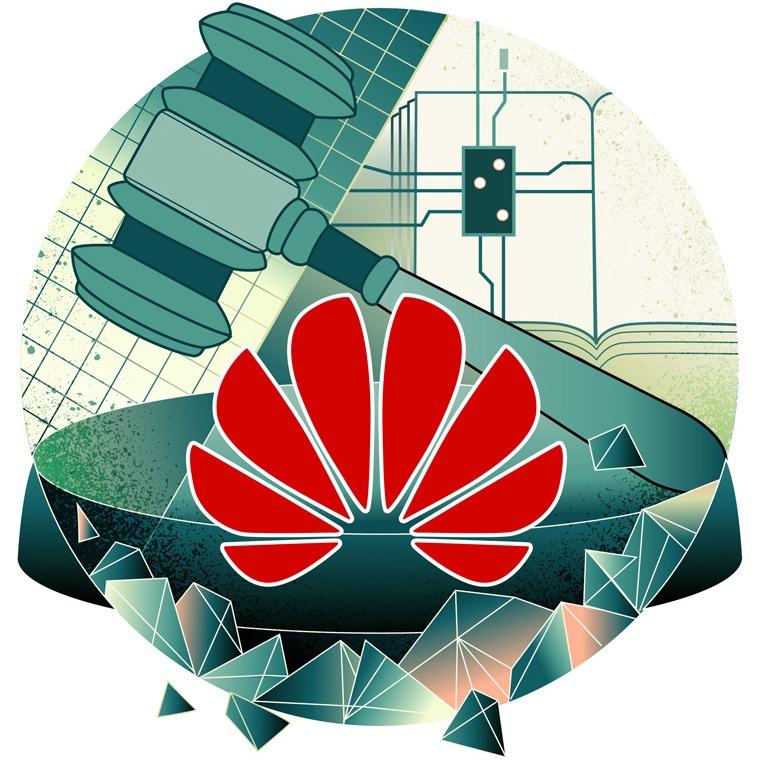 (SHI YU / CHINA DAILY)
(SHI YU / CHINA DAILY)
Washington has been trying to strangle Huawei and other Chinese high-tech companies globally. The United States' request to Canada to arrest Huawei chief financial officer Meng Wanzhou in December 2018 reminds the world how US agents arrested French conglomerate Alstom's senior official Frederic Pierucci in 2013 and how US lawyers, companies and government departments together "dismembered" Alstom, a growing competitor to US companies.
The US is again thwarting its global competitors using non-market means. Last year, it blocked the sales of chips, semiconductors and other components to Huawei, and made it mandatory for companies to obtain export licenses from the US Department of Commerce before doing business with Huawei.
The new US president should know that injustice against innocent people and companies can disturb the established world order. Hopefully, the new US administration will help the rest of the world to re-invigorate free trade and boost high-tech development
Huawei's legal team took the floor recently in the British Columbia Supreme Court, where Meng is fighting extradition to the US on false charges.
Her lawyers asked why her arrest did not set off "alarm bells" for the federal police officers, because there was a clear abuse of process by the Canadian and US authorities during her arrest, and the recent testimony of the officers contradicts what happened during the arrest.
According to the court documents, Meng's arrest was delayed due to "safety concerns" until she got off the plane so the Canada Border Services Agency officers could question her for three hours without legal representation and seize her electronic devices before handing her over to the Royal Canadian Mounted Police.
But there was no mention in the federal police officers' log about any imminent safety concerns before the arrest. Also, the officers did not search for knives or other tools, and instead first seized Meng's cellphone and put it in a specialized Faraday bag to block any electronic signals.
The "seamless" next move was for the border agent to hand over Meng's mobile pass-code to the police, which the agent later embarrassed himself by confessing that it was a "mistake".
The affidavit based on which the judge issued an arrest warrant against Meng was contradictory as well, because the Canada Border Services Agency told the arresting officers that Meng owned two homes in Vancouver but the fact was not mentioned in the affidavit-which wrongly said Meng had no ties with Canada.
Meng is now under partial house arrest in her home in Vancouver. The trial is expected to be over in April 2021, but it could drag on for years because appeals will likely be made since the premise of the affidavit was violated during the arrest, and there was a clear violation of the basic legal rights of an individual who is a senior executive of a well-respected Chinese company that is a leader in 5G technology and could challenge the leading telecom companies of the West in the region.
Not just Canada, even the United Kingdom is no longer acting like a country with an independent foreign policy, or as pro-free trade as before. In general, the "Five Eyes"-the UK, the US, Australia, New Zealand and Canada-have been making concerted efforts to contain China.
Ironically, what the Five Eyes are accusing Huawei of is exactly what they seem to be doing. The five countries have a global surveillance program, which is capable of monitoring the data of the entire global population by intercepting and/or accessing people's private communications including emails, text messages and phone calls from satellites, phone networks and fiber optic cables, as well as from the user data mined by high-tech companies.
Yet several senior UK officials have been alluding to so-called security issues to keep Huawei at bay from the country's 5G networks despite MI5 saying a couple of times that Huawei does not pose any significant security risk. How Huawei should be treated is something people in the UK have not reached a consensus on.
On the other hand, American whistleblower Edward Snowden, former National Security Agency contractor, has exposed US mass surveillance programs such as the notorious PRISM, which has direct access to the servers of several high-tech giants in the US. And Washington is taking advantage of the data collected from around the globe.
Meng's arrest has soured relations between Beijing on one side and Washington and Ottawa on the other.
But despite the Chinese Foreign Ministry declaring that Meng is a victim of a political game, Beijing has been careful to not make any myopic retaliatory moves, except relating every single matter to the larger US-China conflict that includes the trade war as well as the high-tech war.
US President Donald Trump launched his "America first" policy especially targeting the Chinese economy.
But by trying to decouple the US and Chinese economies, he has harmed the high-tech sector's development and caused massive job losses. And blaming China and Chinese companies for all the ills facing the US could be a ploy to deflect public attention from the US administration's disastrous handling of the COVID-19 pandemic.
The new US president should know that injustice against innocent people and companies can disturb the established world order. Hopefully, the new US administration will help the rest of the world to re-invigorate free trade and boost high-tech development.
The author is a professor at the Paris School of Business, and Southwestern University of Finance and Economics, and a commentator on China's economy and world politics.
The views don't necessarily reflect those of China Daily.


